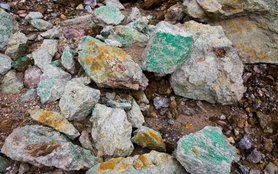Xinka activists fighting a silver mine deserve international support as they face down threats.
It was a moving ceremony. On June 6, an Indigenous organization from Guatemala—the Xinka Parliament—received the 2023 RFK Human Rights Award for tireless actions in defense of its ancestral lands.
At issue for the group is a huge silver mine—one that was never accepted by the region’s Xinka population. Communities view it as a threat to the environment and to their agricultural livelihoods. A 2019 study of water samples from neighboring communities revealed heavy metals like arsenic, cadmium, and manganese above recommended levels, heightening community concerns.
Xinka activists have been successful in shutting down the mine’s operations: in 2018, Guatemala’s Constitutional Court issued a decision that suspended the company’s authorization to operate until the government conducts proper consultation with the Xinka community. (Read a profile of an activist.)
Now, the Xinka Parliament is playing a central role in this consultation. What remains to be seen is if in the end all parties will respect their right to give or withhold their free, prior and informed consent (FPIC), which is a right recognized under international law. In any case, after a decade-long struggle, global recognition is welcome.
The deadly price of defending the environment
Two Xinka activists—Luis Fernando Garcia Monroy and Irma Pacheco Reyes de Reynoso—represented the Xinka Parliament at the ceremony alongside the Parliament’s President and legal counsel. Both Garcia Monroy and Pacheco have suffered devastating losses in their campaign against the mine.
Garcia Monroy was shot in the face while participating in a peaceful protest. Afterward, he struggled through multiple surgeries and a slow and painful recovery. Pacheco has paid an unthinkable price. She and her family were active in efforts to protest the mine in their community; on April 13, 2014, assailants severely injured her husband Alex and killed their 16-year-old daughter Topacio. (You can read more about their story here.)
Unfortunately, the case of Topacio Reynoso is one of many around the world: Front Line Defenders documented more than 401 targeted killings of human rights defenders in 2022. Over two-thirds of the documented murders occurred in Latin America, with attacks on defenders working on land, Indigenous, and environmental rights accounting for nearly half the deaths.
The U.S. has a role to play in protecting these important activists, and Oxfam has been supporting the Xinka Parliament to make their voices heard.
Members of Congress step up
In the U.S., 13 Congressional champions recognized the urgency of this case and united to express their concern over ongoing threats to Xinka peoples’ lands and security. In a letter submitted to Secretary Blinken on September 14th, they ask that the US publicly affirm the right of the Xinka people to self-determination and to FPIC.
The letter also urges the Inter-American Commission on Human Rights to extend precautionary measures to five Xinka leaders—a step that would trigger additional actions by the Guatemalan government to provide them with security.
And on March 23, Senators Menendez, Cardin, Shaheen, Coons, and Murphy introduced the Global Voices of Freedom Act, which seeks to place the full diplomatic power of the government behind protection efforts.
If passed, the bill would require the Biden administration to create a whole-of-government strategy to strengthen protections for at-risk rights defenders, create a dedicated section regarding threats to rights defenders in the State Department’s annual Human Rights Report, implement mandatory training on how to monitor and respond to threats against rights defenders for all U.S. diplomats, and increase protections for civil society leaders engaged in multilateral spaces.
“Often, human rights defenders are the only ones in their country willing to fight for the protection of human rights, combat corruption, or speak truth to power, despite the grave risks they face for doing so,” says Senator Bob Menendez, Chairman of the Senate Foreign Relations Committee. “In this fight, they deserve nothing less than the United States’ unwavering support.”
We couldn’t agree more.



